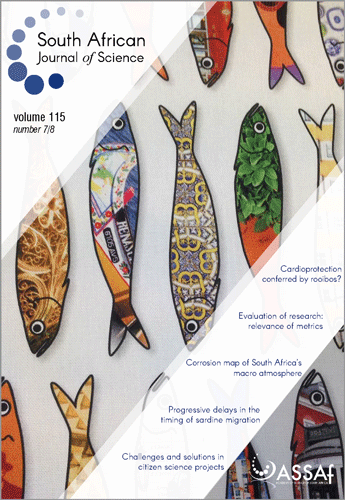Biodegradability and kinetic studies on biomethane production from okra (Abelmoschus esculentus) waste
DOI:
https://doi.org/10.17159/sajs.2019/5595Keywords:
biodegradability, methane production, kinetics, anaerobic digestionAbstract
Emerging from the energy crisis of 2008 in South Africa, climate change concerns and the global desire to reduce high ozone-depleting emissions, renewable energy sources like biogas are gaining wide acceptance in most localities for heating and electricity. The paucity of feedstock varieties is a major challenge plaguing the sustainability of this sector. Biomethane potential, biodegradability and degradation kinetics of organic substrates are essential for assessing the suitability of feedstocks for methane generation and the overall performance of the anaerobic digestion process in biogas plants. Waste from the vegetable okra (Abelmoschus esculentus) is a novel substrate; its biodegradability and degradation dynamics in biomethane production are largely unstudied, and were therefore the aims of this research. The substrate was digested for 25 days at the mesophilic condition and the biomethane potential data were recorded. Measured data of methane yield and the elemental composition of the substrate were used to fit five models (modified Gompertz, Stannard, transference function, logistic and first-order models) to predict degradation parameters and determine biodegradability of the substrate, respectively. Low lag phase (0.143 d), positive kinetic constant (0.2994/d) and the model fitness indicator (<10) showed that transference and first-order kinetic models predicted the methane yield better than did other growth functions. The experimental methane yield was 270.98 mL/gVS, theoretical methane yields were 444.48 mL/gVS and 342.06 mL/gVS and model simulation ranged from 267.5 mL/gVS to 270.89 mL/gVS. With a prediction difference of 0.03–1.28%, all growth functions acceptably predicted the kinetics of A. esculentus waste. The findings of this study offer information on this novel substrate important for its use in large-scale biogas production.
Significance:
- Growing interest in biogas technology as an alternative energy source for both South African rural dwellers and industries, has mounted enormous pressure on known feedstocks, and instigated the search for novel substrates.
- Our study shows that okra waste is a viable feedstock for biogas production.
- The suitability of the first-order kinetic model over other models in predicting okra waste degradation was highlighted.
Published
Issue
Section
License

All articles are published under a Creative Commons Attribution 4.0 International Licence
Copyright is retained by the authors. Readers are welcome to reproduce, share and adapt the content without permission provided the source is attributed.
Disclaimer: The publisher and editors accept no responsibility for statements made by the authors
How to Cite
- Abstract 874
- PDF 1000
- EPUB 235
- XML 438












.png)